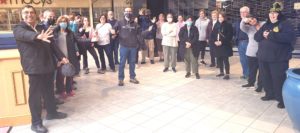A Wellness Q&A with Dr. Mike Rocha
In honor of American Heart month and its goal of raising awareness of cardiovascular disease prevention, Senior Scope spoke with Dr. Mike Rocha, the New Bedford cardiologist and wellness leader, who started the Walk with a Doc program in in the city.
What led you to start Walk with a Doc? Have you met your goals?
In 2014, there was an article published in The Standard-Times on the findings of the Tufts Healthy Aging Collaborative that showed that the health of our elderly population was overall one of the lowest in the state.
We scored low in almost all aspects including heart health, mental health, and prevention. The take home message was that pills and procedures aren’t enough for keeping us well and that more could and should be done. This is when we started a monthly walk as a first step. In 2015, we officially became part of the international Walk with a Doc program founded by cardiologist David Sabgir in Columbus, Ohio.
We started small and over the years have added more doctors and nurse practitioners to lead the walk from all of the local health systems to achieve the goal of being weekly. We have had setbacks with the pandemic when we had really grown the numbers of our weekly walkers in 2020 but we are building it back up again. We were one of the first Walk with a Doc groups to get back going outside in the summer of 2020.
We are able to discuss current health topics and answer questions at each walk. During the pandemic, a lot of attention went toward COVID-related topics but most recently we had the opportunity to discuss cardiac arrest in the setting of the Buffalo Bills player, Damar Hamlin, and the importance of learning CPR.
I do feel that our initial goal of starting movement and mindset has been planted but the obstacles to creating a healthier population is a huge task requiring buy-in at many levels. This is our contribution toward this goal while we work toward the bigger task of a healthier Greater New Bedford.
Have you seen friendships develop?
We have many regular walkers and they usually recruit friends and family to join us. The benefit of walking goes far beyond the physical benefit. The social connections may be the biggest benefit that builds a sense of community. People have their own walking partners that have developed over the years. We continue to see study after study that points out that social connections are a huge contribution to our well-being.
What’s been your most enjoyable moment from the program?
We have witnessed some inspiring things over the years. One woman was pushed by her daughter in a wheelchair around the route. One gentleman in his 90’s shows up periodically and walks with a walker for part of the walk. We had another person with severe deforming arthritis walk weekly.
We have witnessed transformations where people can barely make a small portion of the walk and eventually increase their capacity to complete the full walk. These personal triumphs are opportunities to celebrate their achievements. We meet people where they are at, as this is not a race. People can participate at any pace and do as much of the walk as they are comfortable.
What are the benefits of walking, beyond physical gains?
Dr. John Ratey, a psychiatrist in Boston, has a wonderful quote that exercise is like getting a small dose of Ritalin and Prozac. He is absolutely correct that walking and exercise positively impact our brain neurotransmitters and can help our mental well-being. Just yesterday, I saw a patient in the office that remarked how regular walking has improved their mood.
How important is it that physicians lead the walk?
The opportunity to interact with patients and the community fills the soul as a physician. It is a privilege to practice in the community that I grew up in. I really feel that what we are doing is walking medicine to be filled each week at Buttonwood Park (Mall in the winter). The physicians and nurse practitioners really enjoy leading the walks as it gives an opportunity to connect in a unique way outside of the office.
What are your top suggestions for older adults to do this month?
The first thing that we all need to do is be kind to ourselves. We are often comparing ourselves to others and judging ourselves harshly. We need to start where we are and keep going.
Pick something to change that is reasonable and try to stick with it. Walk 5 to 10 more minutes a day or a little more of whatever we like to do to move our bodies. Make one healthier choice a day in our diets. An extra veggie, salad, or fruit a day and one less food out of a package can make an impact.
Most importantly, being grateful for those around us and putting effort into our social connections are perhaps the best things for our heart.


Recent Comments